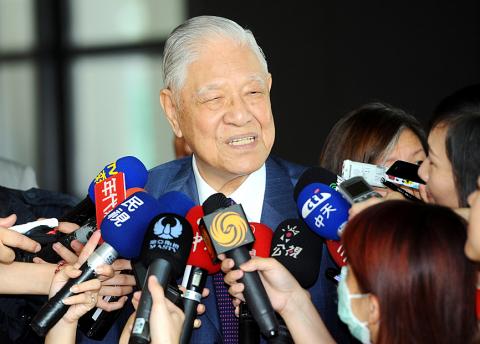Former president Lee Teng-hui (李登輝) yesterday began a three-day trip to agricultural areas in Chiayi and Tainan in the hope of understanding more about the sector, which used to be Taiwan’s pride, but has been facing numerous challenges in recent years.
This was the 89-year-old’s second trip to southern Taiwan, after a visit to Greater Kaohsiung and Pingtung County last month. He has been recovering from surgery to remove a cancerous tumor in November last year.
Lee highlighted the importance of the agricultural sector in his remarks yesterday evening to about 100 people in Jingliao Village (菁寮), Houpi District (後壁), Greater Tainan, which is known as a rice-growing area.

Photo: Chang Chia-ming, Taipei Times
As an agriculture major at university and an agricultural official early in his political career, Lee said he has always paid special attention to the development of this important sector and reiterated that the government should stop exploiting farmers and further develop the strategically vital industry.
Agriculture cannot be developed without appropriate planning for land use and water resources, and the government should help farmers with these issues, he said, adding that the government should also encourage rice consumption.
With rising commodity prices, in particular fertilizers, farmers are entitled to demand government subsidies, Lee said.
“If the government will not grant a subsidy, you have every right to march on the streets to voice your opposition. And if you go, I will go with you,” he said.
Earlier in the afternoon, the former president had a glimpse of one of the sector’s star industries with a stop at Norman Orchids, an orchid farm located in Tainan Biotechnology Science Park with annual revenues of NT$200 million.
On Tuesday night, Lee gave a rare two-and-a-half-hour interview to Sanlih TV in which he addressed issues that included Taiwan’s sovereignty and engagement with China, his observations on President Ma Ying-jeou (馬英九) and the domestic economic situation.
Lee reaffirmed democracy and freedom were Taiwan’s “backbone” and said rhetoric about “one China” and nationalism was already “outdated”.
He repeated several points he had made during his first visit to southern Taiwan last month, saying that Ma viewed himself as an “emperor” who could rule the country on his own and that he should report to the Legislative Yuan.
Lee said Beijing would not be able to annex Taiwan as the US had turned its focus back to the Asia-Pacific region, especially northeast Asia.
As for state-run companies, Lee said they should be privatized to increase their competitiveness.

Chinese Nationalist Party (KMT) Chairman Eric Chu (朱立倫), spokeswoman Yang Chih-yu (楊智伃) and Legislator Hsieh Lung-chieh (謝龍介) would be summoned by police for questioning for leading an illegal assembly on Thursday evening last week, Minister of the Interior Liu Shyh-fang (劉世芳) said today. The three KMT officials led an assembly outside the Taipei City Prosecutors’ Office, a restricted area where public assembly is not allowed, protesting the questioning of several KMT staff and searches of KMT headquarters and offices in a recall petition forgery case. Chu, Yang and Hsieh are all suspected of contravening the Assembly and Parade Act (集會遊行法) by holding

PRAISE: Japanese visitor Takashi Kubota said the Taiwanese temple architecture images showcased in the AI Art Gallery were the most impressive displays he saw Taiwan does not have an official pavilion at the World Expo in Osaka, Japan, because of its diplomatic predicament, but the government-backed Tech World pavilion is drawing interest with its unique recreations of works by Taiwanese artists. The pavilion features an artificial intelligence (AI)-based art gallery showcasing works of famous Taiwanese artists from the Japanese colonial period using innovative technologies. Among its main simulated displays are Eastern gouache paintings by Chen Chin (陳進), Lin Yu-shan (林玉山) and Kuo Hsueh-hu (郭雪湖), who were the three young Taiwanese painters selected for the East Asian Painting exhibition in 1927. Gouache is a water-based

Taiwan would welcome the return of Honduras as a diplomatic ally if its next president decides to make such a move, Minister of Foreign Affairs Lin Chia-lung (林佳龍) said yesterday. “Of course, we would welcome Honduras if they want to restore diplomatic ties with Taiwan after their elections,” Lin said at a meeting of the legislature’s Foreign Affairs and National Defense Committee, when asked to comment on statements made by two of the three Honduran presidential candidates during the presidential campaign in the Central American country. Taiwan is paying close attention to the region as a whole in the wake of a

OFF-TARGET: More than 30,000 participants were expected to take part in the Games next month, but only 6,550 foreign and 19,400 Taiwanese athletes have registered Taipei city councilors yesterday blasted the organizers of next month’s World Masters Games over sudden timetable and venue changes, which they said have caused thousands of participants to back out of the international sporting event, among other organizational issues. They also cited visa delays and political interference by China as reasons many foreign athletes are requesting refunds for the event, to be held from May 17 to 30. Jointly organized by the Taipei and New Taipei City governments, the games have been rocked by numerous controversies since preparations began in 2020. Taipei City Councilor Lin Yen-feng (林延鳳) said yesterday that new measures by